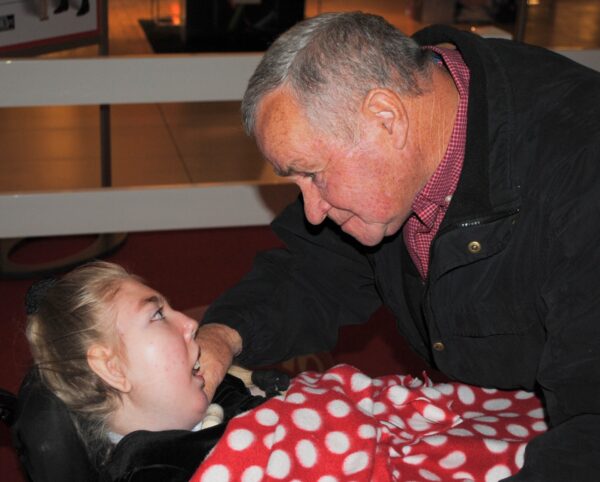
Marissa Anderegg and Marv Penrod, who along with his wife Lori is Marissa’s legal guardian, have always shared a special bond. Marissa, age 19, is one of the Akron Children’s Haslinger Family Pediatric Palliative Care Center’s original patients.
There is no shortage of love in the Penrod household. It flows between Lori and Marv Penrod and Marissa Anderegg, their 19-year-old daughter who has several life-threatening conditions. From there, it extends to include Akron Children’s Haslinger Family Pediatric Palliative Care Center, which has made caring for Marissa at home possible.
“Palliative Care has always been there for us,” said Lori Penrod of Massillon, Ohio. “They give us strength and help us navigate situations. It’s like someone waves a wand and it gets fixed. Whenever we see them, they feel like family.”
Marissa, who goes by the nickname Rissy, is one of Palliative Care’s original patients. The center, founded in 2002 and now in its 20th year, has supported Rissy and her caregivers since she was born in July 2003. Diagnosed with hypoxic ischemic encephalopathy (HIE), a brain injury that is caused by lack of blood flow and oxygen to the brain, Rissy has severe disabilities, including epilepsy and paralysis.
Rissy’s early years
Lori has been part of Rissy’s life since she was born. Originally, Lori was one of the nurses who provided private duty nursing care to Rissy in her aunt’s home.
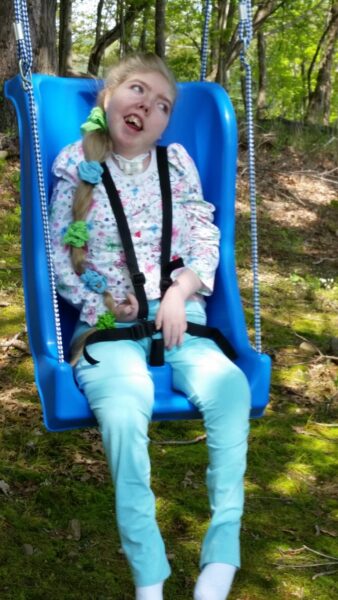
Marissa Anderegg, who goes by the nickname Rissy, enjoys spending time outdoors. One of her favorite things to do is to swing and enjoy the lake breeze at her family’s campsite on Leesville Lake.
“My daughter, who is also a nurse, was one of Rissy’s nurses,” Lori said. “She told me the family needed additional help. When I went there to meet them, I saw Rissy, the most perfect little baby. She honestly looked like a porcelain doll.”
Rissy’s family was told that the average lifespan with her degree of HIE is two years. Despite her complex health care needs and their impact on her life, Rissy has overcome many setbacks. Lori was often the nurse on duty when Palliative Care visited Rissy or one of its team members was involved in her care. Through these interactions, Lori developed relationships with Children’s Palliative Care team.
“Since Rissy doesn’t talk or move, it’s easy for her to seem invisible to people,” Lori said. “But Palliative Care has always seen Rissy for the person she is and ensures she receives the care and services she needs physically, mentally and socially.”
Joining the Penrod family
When Rissy’s aunt died suddenly, Lori and Marv stepped in to provide Rissy’s care in their home. Although Marv was retired and the couple already had two adult children, they felt like “God had His hand in this,” Lori said.
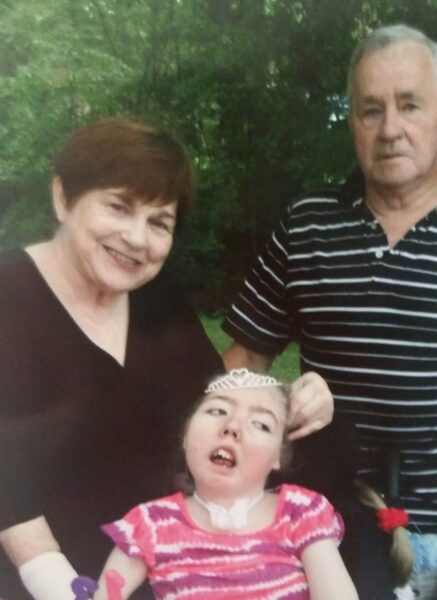
Rissy Anderegg is shown with Lori and Marv Penrod, her legal guardians and primary caregivers. The Penrods tell everyone that they are the lucky ones because when Marissa moved in with them, they saw miracles happen on a regular basis as she developed. Their family mantra since Rissy moved in is, “If you think our hands are full, you should see our hearts!”
Eight years ago, they became Rissy’s custodians and, eventually, her legal guardians when she turned 18. Palliative Care helped make transitioning and managing Rissy’s intensive health care at home easier.
“They offer symptom management and quality-of-life support,” Lori said. “Not just to Rissy, but to those around her. They look out for Marv and me, too.”
Lori often turns to Stephanie Allen, nurse case manager at Akron Children’s Palliative Care, who serves as a liaison between patients and caregivers and the transdisciplinary team that delivers patient care. Through Palliative Care’s guidance, the Penrods were able to navigate the process to get Rissy’s insurance to cover modifications to their home to make Rissy’s care safer and easier. The modifications included:
• A ceiling rail system to lift and maneuver the 85-pound teen into her wheelchair or swing, allowing her to enjoy the family’s backyard, gardening and their camp site on Leesville Lake
• A roll-in shower for bathing
• A stairlift when they need to transport Rissy in a vehicle
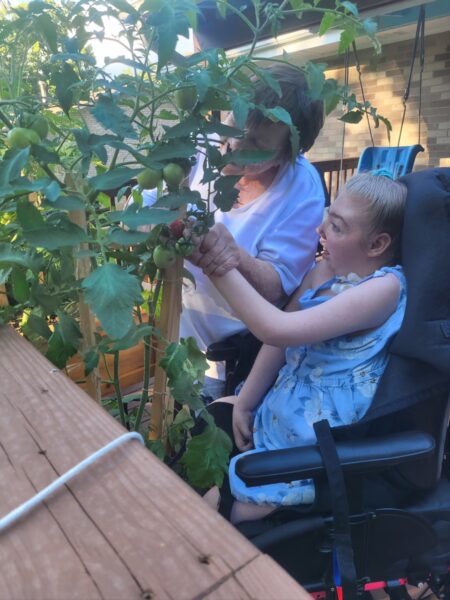
The Penrods discovered that Rissy Anderegg loves to play in the dirt. Lori and Rissy work in Rissy’s container garden on the family’s patio where she grows tomatoes and numerous vegetables and flowers.
“Once, Stephanie was here after I had just been diagnosed with breast cancer,” Lori said. “We walked outside and I burst into tears. Stephanie told me, ‘We got you. We got your back.’ Stephanie and the people she works with have never let us down.”
Rissy’s physicians also impress Lori because of the way they hone in on symptoms and find solutions. For instance, during a check-up with Sarah Friebert, MD, pediatric palliative care physician and founder and director of the Haslinger Family Pediatric Palliative Care Center, Rissy acted as if she was in pain.
“Dr. Friebert watched her for awhile and said, ‘I think Rissy has acid reflux.’ She prescribed a heartburn medication and Rissy has been fine ever since,” she said.
A kid who likes to play
Rissy uses a tracheostomy tube and ventilator to breathe and requires a gastrostomy tube inserted into her stomach to get nutrition, but she is still a kid. Marv and Lori make sure Rissy gets plenty of play time by adapting her toys with toggle switches and/or involving her in whatever they’re doing wherever they are. It’s how they discovered Rissy’s favorite flavor, peppermint, and her preferred color, purple.
High school is also part of Rissy’s life. A Jackson High School teacher comes to the house to minimize Rissy’s risk of infection. In her occupational therapy class, Rissy uses electrically operated scissors for crafts and projects.
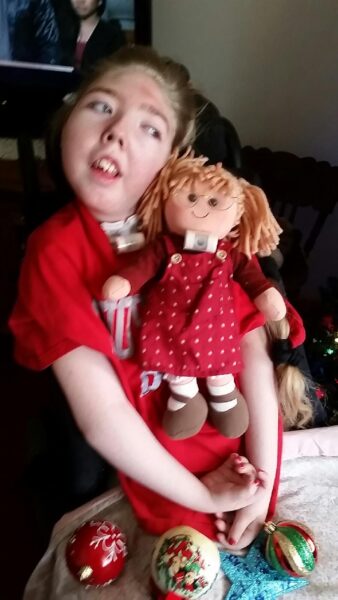
The Penrod’s oldest daughter made this doll for Rissy so she would have a friend “just like her.” The doll even has a tracheostomy tube like Rissy.
“Sometimes, the occupational therapist shows Rissy something and she’ll refuse to do it,” Lori said. “Then, Marv walks up to her and says, ‘Rissy, will you do this for me?’ She always does. He’s her hero.”
Hard discussions
Now that Rissy is an adult, she is getting closer to aging out of pediatric care services. Palliative Care is leading that discussion with the Penrods, helping to create a seamless transition. They’ve also led other conversations, such as end-of-life options.
“We describe our services as a ‘palette of care,’” Stephanie Allen said. “Some patients may only use one service, such as those found in our Emily Cooper Welty Expressive Therapy Center. But if they need help with other services, we’re here for them.”
Rissy’s family was able to make use of these services, including virtual visits, which ensured she received continuity of care, especially during the pandemic.
“What makes us unique is that we’re not a one-size-fits-all model,” Stephanie said. “We operate 24/7 and are one of the largest and most diverse groups in the country in terms of services and what we do. We continue to find new and innovative ways to provide care to our patients and their families.”
The Haslinger Family Pediatric Palliative Care Center celebrates its 20th anniversary on June 8, 2023. Dr. Friebert and the Palliative Care team have touched the lives of more than 4,000 children and their families facing chronic, complex and life-threatening illnesses from 52 Ohio counties and seven states. View this Palliative Care video to learn more.










